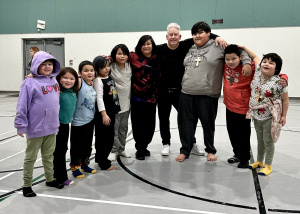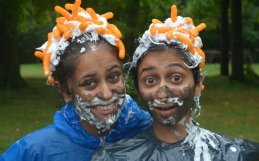FRIENDSHIP
Helping children develop strong relationships can help create the foundation for future relationships. Here are a few strategies that will help children build successful
Relationships.
● Establish play days for your child and note where they may need help interacting. Are they picking up social cues? Are they a good host? Is their behaviour negatively affecting their interactions?
● Enroll your child in an activity where they can meet other kids who share their interests.
● Establish the Rule of Three. They are not allowed to quit an activity until they have tried it at least three times.
● Do not allow your children to become couch potatoes. Your family’s expectation is that they are going to be involved in extracurricular activities.
● Help children assess whether there may be something they are doing that deters a friendship.
● Teach your child how to introduce themselves. At Kids 4 Kids, I teach children how to introduce themselves properly. It is amazing how many children do not know this basic format. Children who know how to introduce themselves leave a powerful impression on the person they’re with.
TEACH YOUR CHILD ABOUT THE QUALITIES THAT MAKE GREAT FRIEND
Don’t assume your child knows what makes up a great relationship. Teach them.
● Trustworthy
● Compromise
● Listening
● Fairness
● Being a great host
● Inclusion
● Remembering important dates
● Non-judgemental
● Acceptance
● Respect
● Forgiveness
● Support
● Thoughtful
● Loves you for you
Teach them to look for clues that will help them get a conversation going. For example, if your child wants to initiate a conversation with someone who is Wearing a Toronto Maple Leaf hockey jersey, your child could start a conversation about hockey. Look for conversation starter clues.
Look for conversation starter clues.
Most children are afraid of being rejected. Help them realize that although some kids may not want to be their friend, the risk of hearing “no” is not close to the feeling of getting the “yes” and finding a best friend. It’s worth the risk.
When I was young, I was a very shy boy. It was tough for me to initiate a friendship. What helped me was having a parent who made me join clubs like Cub Scouts and sports like hockey and soccer. These opportunities gave me the chance to meet other kids who had similar interests. Seeing kids every week eventually led me to make new friends. The more success I had in making friends, the more confident I became involved in initiating conversations. If it were up to me, I would not have taken the risk of joining clubs and going to camp. Sometimes, kids need a little encouragement to lead them to their success.
Teach children that friendship is a two-way street. If your child is making all the effort, it is not a friendship relationship as a relationship requires the effort of two or more people.
Encourage their interests, as this will lead to clubs with potential friends and a way of improving self-esteem. Children love magic. So do I. My self-esteem and confidence improved dramatically after I performed a magic show for my grade 7 class. Encourage your child’s interests, and look for other children who have the same interests and make the connection.
BECOME AN EMOTION COACH: Help your child regulate and understand their emotional responses. Studies show that parents who help their children problem-solve their child’s emotional reaction to an event have children who can regulate their behaviour. This is important when your child is trying to make friends and build a reputation that attracts friendship.
Parents who trivialize their child’s behaviour, i.e. “You are being silly” or “Stop misbehaving,” have children who have difficulty acquiring the skills to regulate their behaviour.
PRACTISE AUTHORITATIVE PARENTING (not authoritarian) PARENTING
Studies of both Western and Chinese children report that kids are more likely to be rejected by their peers when their parents practice authoritarian parenting, an approach characterized by low levels of warmth and high levels of control. Authoritarian parents discourage thoughtful discussion and attempt to control behaviour through punishment. Kids raised this way are less likely to develop an internalizedand wrong. Kids are subjected to harsh punishments that tend to show hostility and aggression (Xuet al. sense of right 2009; Chen and Rubin 1994).
TEACH EMPATHY
Look for examples of social situations in daily life that will teach empathy.
Helping children understand how to sympathize and understand another person’s point of view.
Also, help them see there may be more to the story than you see. STORY: A young man came to school every day in tears. He was eventually called a crybaby by the boys in his class. The students eventually found out that the boy, who was always in tears, was dealing with a mom who had cancer. When they found out this part of the story, they were able. to be more empathetic. There is always more to a person’s story than what you see.
HELP KIDS READ FACIAL EXPRESSIONS
Play the FACEOFF game. Sit in the food court of the nearest mall, and try to guess how the people you see are feeling. Point out their facial expressions and how their body language dictates how they feel. You can also use the events. your child goes through to highlight how facial expressions and body language show how a person feels. Parent: “I can tell by the expression on your face and how you are slouching in the chair that you have had a bad day.”
WATCH WHO YOUR CHILD ARE FRIENDS WITH
Studies have shown that children whose peers are more aggressive tend to be more aggressive. themselves. Children will imitate the behaviours of their peer groups. As a parent, monitor who your child decides to befriend.
STORY: My friend Mark White was an athlete and a mannered young man until he was 16. He started hanging around an older group of boys who loved to party. They also loved drinking and smoking pot. Over a six-month period, Mark changed. His appearance became untidy; he became apathetic and no longer interested in sports. The influence of his peers had a significant, negative impact on Mark’s life.
LET KIDS WORK OUT THINGS ON THEIR OWN
In my line of work, I see children as old as 14 years old have their parents run to the rescue and solve problems they are quite capable of solving themselves. There are events that parents should intervene in. However, there are times when children should be encouraged to come up with the solutions themselves.
STORY: In Thornhill, there was a parent meeting about an upcoming school ski trip. Parents were asking questions like who will make sure my child wears his hat and mitts if it’s really cold outside? Who will ensure my child is eating enough at meal times? These students were in grade 8. This is an example of parents intervening when they shouldn’t. If you are fourteen years old and don’t learn from the consequences associated with not wearing the proper clothing in the winter then there is a problem.
YOU ARE THEIR FIRST TEACHER
You are your child’s first teacher. You have a great influence on how your child feels about themselves and how they interact with others. Take the time to pay attention to them, offer them. support and look for teachable moments that you can use to teach them about the value of themselves and how to develop successful, positive relationships.
The struggles you go through now with your children can be the opportunities that will help. develop them into successful adults who are passionate about life, who develop into leaders who add value to others and teach others from the lessons they have learned on the way
Share this!
Share on Facebook
Share on LinkedIn
Tweet about this on Twitter
Share on Google+Pin on Pinterest












